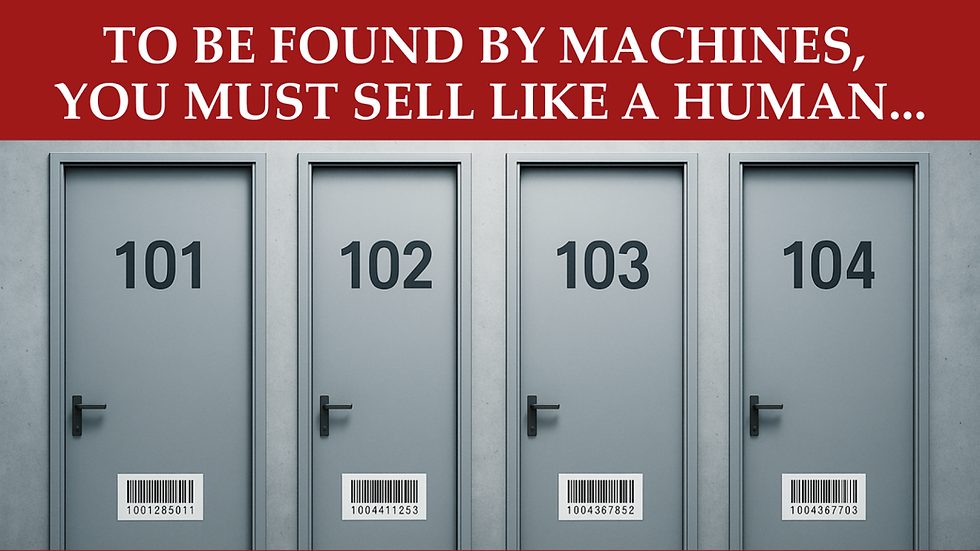Categorization kills the true soul of hospitality
- Markus Mueller
- Jul 24, 2023
- 5 min read
Updated: Aug 9, 2023
Let’s start with the good news. Our industry has made some great strides in streamlining processes and enhancing the guest experience. However, there is one aspect that often goes unnoticed - the impact of categorized inventory management on the genuine essence of hospitality. Reassessing how inventory is being managed and sold is a long overdue exercise that has been completely ignored … until today!
While categorisation may seem like a practical solution for inventory management, it is not without its problems. Costs, operational flaws, automation limitations…the list is endless. In this blog post, we will delve into how categorization hinders the true soul of hospitality and why it is crucial to reconsider its implications.
1. Fulfilment of guest room requests requires significant manual effort.
When guest room requests are bound by rigid categories, fulfilling specific preferences becomes a challenge. Manual intervention becomes necessary to accommodate unique requests that cannot be booked and confirmed online. This not only consumes valuable time and resources but also diminishes the seamless experience guests expect in today's digital age. Fulfilling guest preferences also results in operational challenges for the remaining inventory to be sold due to blocked room spaces.
2. Unfulfilled guest requests impact stay experience and can result in bad reviews.
The inability to fullfil guest room requests can have a direct impact on the overall stay experience. Guests whose preferences are disregarded or unmet may feel dissatisfied and disappointed. This, in turn, can lead to negative reviews, damaging the reputation of the establishment and potentially deterring future guests. Once a guest has experienced a problem, they become much more sensitive to further issues that they would otherwise overlook. It can be a vicious circle…

3. Lack of transparency at the time of booking creates false stay expectations.
Categorization often limits the information that can be provided to guests during the booking process. As a result, guests may have unrealistic expectations about their stay. They may expect a room similar to the picture they saw at the time of booking and may assume certain amenities or features are included based on the category, only to be disappointed upon arrival. This lack of transparency can undermine trust and tarnish the relationship between guests and hospitality providers.
4. Lost upselling opportunities of specific room characteristics.
Categorizing rooms restricts the ability to upsell specific room characteristics to guests. By treating rooms as commodities, the opportunity to highlight unique features, such as high floors with stunning views or rooms with special amenities, is lost. This not only limits potential revenue but also denies guests the chance to customize their experience according to their preferences.
5. Demand management and restriction settings on solely room categories lead to split stays and category overbookings.
Implementing demand management and restriction settings solely based on category levels can have unintended consequences. Split stays, where guests need to switch rooms during their stay, are common. Additionally, overbookings within specific categories occur, leading to operational challenges and missed revenue opportunities due to the need for upgrading and shifting existing reservations to accommodate the overbooked reservation. The opportunity cost of such practices can be significant and often goes untracked.
6. Commoditization of room products leads to a loss of distribution control.
Categorizing rooms can inadvertently contribute to the commoditization of room products. With a focus on categories, the unique aspects and value propositions of individual rooms can be overshadowed, making them more comparable. Consequently, the ability to attract the right target market becomes primarily dependent on brand scale and marketing budget.
While categorized inventory management brought some benefits in terms of operational efficiency in the past, it is essential to recognize its potential drawbacks in the realm of true hospitality. By limiting flexibility, personalization, and transparency, categorization can dilute the essence of hospitality and compromise guest satisfaction. While it was a necessary approach when hotel reservations became available online back in the 2000s, it is crucial for the industry to reassess its approach to inventory management. We need to find ways to balance efficiency with the preservation of the genuine soul of hospitality in light of the evolution of available technology and the automation of workflows. Only by doing so can we truly provide memorable and personalized experiences that embody the true spirit of hospitality.
With a new data structure and the introduction of a feature-based language, novel applications are now possible for sales, revenue management, distribution, marketing, general guest engagement, and operational automation. It may sound too good to be true, but it is comparable to the invention of X-Ray technology for medical appliances.

While it may seem like a bold comparison, likening the impact of a new data structure and feature-based language to the invention of X-Ray technology for medical appliances, it is not without reason. Just as X-Ray technology revolutionized the field of medicine by providing doctors with a powerful tool to see beyond the surface and diagnose hidden conditions, the new possibilities brought by this innovative approach to inventory management have the potential to revolutionize the hospitality industry.
If you want to learn more about the new possibilities, please contact us at info@gauvendi.com.
Example Use-Case: Free Upgrades & Category Overbookings
With the current inventory structure, hotels often encounter the challenges of category overbookings and split stays. However, by managing inventory on a unit and more granular level, these issues can be effectively addressed through smart automation. By setting maximum length of stay restrictions, the demand can be managed in a way that is optimal for the property, eliminating the need for manual intervention and avoiding operational complications.
Imagine a guest wants to stay at a hotel for 2 nights.
In the first case (Table 1), the hotel manages restrictions by room type, and the guest can book a regular room for the entire stay. But there's a challenge – the hotel does not have the same room open for both nights, which makes it impossible to have the guest in the same room during their stay. The hotel can only upgrade this reservation to another room category if possible at all.
Now, in the second case (Table 2), the hotel manages restrictions on a unit level. They allow guests to stay for only 1 night in any room during the same period, to prevent the issue right from the beginning. This way, they have the best opportunity to achieve full occupancy.
1. Restriction Management on Category Level

2. Restriction Management on Unit Level

1. Length of Stay restrictions on a category level
The absence of automated Length of Stay management or its implementation on category levels only, leads to split stays or category overbookings. This occurs because it fails to consider the specific reservation assignments for each unit based on different arrival and departure dates automatically creating occupancy gaps. Overbooking properties at a category level however still offers flexibility in managing anticipated cancellations when necessary.
2. Length of Stay restrictions on a unit level
Length of Stay management on a unit level to manage demand will always prevent split stays or category overbookings because it considers the different arrival and departure dates of reservations on a unit level and will also fill occupancy gaps effectively. It is not recommended or beneficial however to overbook properties at a unit level. Instead, the use of opaque products or broad categories when overbooking is necessary to effectively manage expected cancellations.
About the Author
Markus Mueller is the co-founder of GauVendi with over 25 years experience in leadership roles in multi-country and culturally diverse hospitality organizations across the Caribbean, Europe, Middle East and Asia within the tourism industry, holding an MBA with Distinction from Warwick Business School.
About GauVendi
GauVendi is an AI-based, feature-based inventory management platform for target group-specific sales and innovative automation for hospitality businesses. GauVendi converts room categories into feature-based inventory and, in turn, into relevant and tailored stay products for better guest experiences, distinct brand positioning, and maximum return on investment




Comments